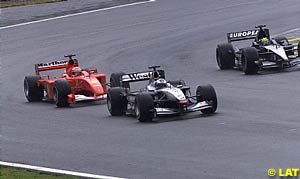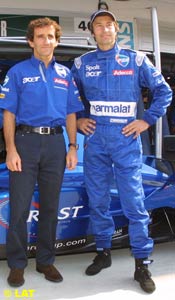
This week's Grapevine brings you |
The rule changes introduced for 2001 were intended to have two effects. The most important, obviously, were those that improved driver safety. The others were supposed to make a step in the direction of easing the difficulty in overtaking.
The limited changes were a cross between what the teams would permit – keeping the status quo suits them, generally – and the FIA's requirements to keep a lid on cornering speed. Considering Michelin's entry, there was a strong belief that tyre improvements through the season would have times tumbling, so it was certain that at something had to be done. That said, the extra groove on the front tyres, contrary to popular belief, was not a stab at slowing the cars down: it was intended to improve the balance of the cars and even up tyre wear.
As it turns out, the net effect of the changes, predictably, was that most of the teams struggled with front end grip for much of the season – Ferrari and Sauber being the obvious exceptions. Both of these teams found good solutions from the outset, finding their chassis well balanced at every venue; others relied on the improvements from tyre development through the season to bring them back in the game.
However, it did illustrate that the changes had made some sort of difference: and indeed, the effects were manifest on track. Putting it into perspective, at every event in the first half of the season which was dry this year and last year, more overtaking was reported for this year. Not only that, but there was an increase in passes for the lead. Whether it was due to the tyre war, with Michelin-shod Williams showing good form, or the new aero restrictions is a moot point.
With times continuing to tumble through the season, the FIA are concerned that their changes were not far reaching enough: already, the cars are running around three or four seconds quicker than last year. The FIA estimated their changes should have cost around two seconds per lap, but improvements in car design from last year will have accounted for about that, with engine development worth a further second, and tyre development standing for the remainder. Given that there's nothing to be done about engines until 2007, any further changes to the formula will need to be aimed at 2003, or brought in with unanimous approval by the teams in the meanwhile. Not a likely proposition, it should be said.
However, the evidence of this last year shows that the changes were apparently the right ones: small enough that the big players were unable to make much advantage from their better development resources, but not so small as to make no difference. The situation can clearly be improved: overtaking is still arguably too big a challenge; but how they can manage another step in the right direction without upsetting the status quo is a tough question that still waits for an answer.
When Frentzen was given his notice by Jordan, he considered the possibility his time in Formula One had come to a close: the damage to his reputation, on top of a lack lustre season, was not what the doctor ordered for a constructive career development path.
Of course, Frentzen is now, if not exactly hot property, still in some demand. He has been offered a chance to drive for Arrows next year too: whilst not exactly midfield runners themselves, the team has secured Cosworth engines for next year, and has a budget to ensure they can do something with them. Testing is a priority, with reliable running for the season opener a must. Arrows sees reliability as their only realistic chance of scoring points, given the performance expectations of the top three outfits. Stands to reason, really.
Given that a seat with the top teams is out of the question, Frentzen is looking for a seat that has some potential. He knows Prost's plans for 2002, but is uncertain about its prospects: the car might be a real gem, but without a season long development effort, the team is going to struggle to beat Minardi and Toyota, which would do his future prospects no good at all. And, of course, it's not nearly as much fun racing a car that's going backwards relative to the opposition all year.
That said, the Prost match has been a two way thing, so far. On first arriving at the factory for a seat fitting, the team made him feel genuinely welcome, in his own right. Despite the manner of his arrival, he has never felt like "Alesi's replacement," and the mechanics have always had time for his input. Of course, he's done almost no testing for the team – the resources had dried up before his arrival – but the atmosphere was one that appealed. He feels part of a team struggling against incredible odds, but with a strong determination to succeed. Which is ironic, considering the low morale that permeated the factory before his arrival, as the season seemed to be going down the pan, along with all promise of funding for next year.
Frentzen's no fool. Prost is the seat he’s looking for, if the team can work out funding for 2002. They need to be able to pay his salary, build the car, pay for the engines, and fund at least a dozen test sessions through the season. And they need to guarantee him they can do it. If they can't, then there is very little he can do for them. Racing is only half the job: Frentzen's real added value comes from his ability to improve the car between events, and he knows it. Given that, he is sure he can help the team improve through the season, and move up the field. Without it, he'd rather work for Tom Walkinshaw, despite the pressure cooker environment that Arrows offers its drivers. At least there, he'd not be stuck at the back of the grid in 2002.
![]() Tackling Overtaking
Tackling Overtaking
 When the changes were announced – a small raising of the front wing, reduced elements in the rear wing, a shortening of the diffuser, and an extra groove on the front wheels – they had a pretty mixed reception. For the most part, it was agreed that it was good to see something being done, but these changes would make little difference.
When the changes were announced – a small raising of the front wing, reduced elements in the rear wing, a shortening of the diffuser, and an extra groove on the front wheels – they had a pretty mixed reception. For the most part, it was agreed that it was good to see something being done, but these changes would make little difference.
![]() Frentzen Playing by the Numbers
Frentzen Playing by the Numbers
 However, the stint at Prost seems to have done the trick. Frentzen’s races have not exactly set the world on fire, but with some excellent qualifying sessions, and solid performances otherwise, he has impressed the men that matter in the team. His mechanics think he's a solid, dependable worker. Despite lacking time in the car, they see him to be as quick as Alesi, but easier to work with. Prost likes his attitude, and the way he has scored a hit with the team from the outset. It stands to reason that he offered Frentzen a seat for 2002.
However, the stint at Prost seems to have done the trick. Frentzen’s races have not exactly set the world on fire, but with some excellent qualifying sessions, and solid performances otherwise, he has impressed the men that matter in the team. His mechanics think he's a solid, dependable worker. Despite lacking time in the car, they see him to be as quick as Alesi, but easier to work with. Prost likes his attitude, and the way he has scored a hit with the team from the outset. It stands to reason that he offered Frentzen a seat for 2002.
Please Contact Us for permission to republish this or any other material from Atlas F1.
|
Volume 7, Issue 43
Atlas F1 Exclusive
Parting is Such Sweet Sorrow
2001 Season Review
The 2001 Race-by-Race Review
The 2001 Drivers Review
The 2001 Teams Review
The Atlas F1 Top Ten
Columns
The 2001 Season Mega Quiz
Elsewhere in Racing
The Bookworm Critique
The Weekly Grapevine
> Homepage |

